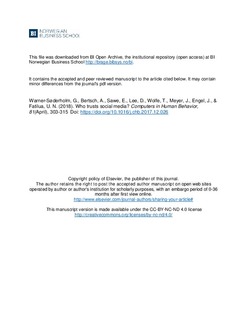Who Trusts Social Media?
Warner-Søderholm, Gillian; Bertsch, Andy; Sawe, Everlyn; Lee, Dwight; Wolfe, Trina; Meyer, Josh; Engel, Josh; Fatilua, Uepati Normann
Journal article, Peer reviewed
Accepted version
Permanent lenke
http://hdl.handle.net/11250/2485848Utgivelsesdato
2018Metadata
Vis full innførselSamlinger
- Publikasjoner fra CRIStin - BI [1015]
- Scientific articles [2181]
Sammendrag
Trust is the foundation of all communication, yet a profound question in business today is how can we psychologically understand trust behaviors in our new digital landscape? Earlier studies in internet and human behavior have shown a significant connection between social media use and user personality (Hughes, Rowe, Batey, & Lee, 2012). Still, the connection between type of online user and their trust values is an under researched area. Today, millions of people globally read newsfeeds and information via their digital networks, but we do not know enough about human behavior related to which specific users of social media actually trust the news they read online. In this study we apply items from five different validated scales to measure trust to investigate to what degree a users' perception of trust varies depending on their gender, age, or amount of time spent using social media. Using a convenience population sample (n = 214) significant differences in levels of trusting behavior were found across gender, age, social media newsfeed preferences and extent of social media use. The findings suggest that women and younger users have the highest expectations for integrity, trusting others and expecting others to show empathy and goodwill. Implications of the results are discussed.
Beskrivelse
The accepted and peer reviewed manuscript to the article
